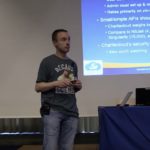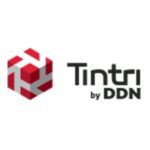Michael Jennings from LANL gave this talk at the Stanford HPC Conference. “As containers initially grew to prominence within the greater Linux community, particularly in the hyperscale/cloud and web application space, there was very little information out there about using Linux containers for HPC at all. In this session, we’ll confront this problem head-on by clearing up some common misconceptions about containers, bust some myths born out of misunderstanding and marketing hype alike, and learn how to safely (and securely!) navigate the Linux container landscape with an eye toward what the future holds for containers in HPC and how we can all get there together!”
Video: HPC Containers – Democratizing HPC
In this video from SC18 in Dallas, CJ Newburn from NVIDIA describes how developers can quickly containerize their applications and how users can benefit from running their workloads with containers from the NVIDIA GPU Cloud. “A container essentially creates a self contained environment. Your application lives in that container along with everything the application depends on, so the whole bundle is self contained.”
VMware Powers Machine Learning & HPC Workloads
In this video from SC18 in Dallas, Ziv Kalminovich from VMware describes how the company’s powerful virtualization capabilities bring flexibility and performance to HPC workloads. “With VMware, you can capture the benefits of virtualization for HPC workloads while delivering performance that is comparable to bare-metal. Our approach to virtualizing HPC adds a level of flexibility, operational efficiency, agility and security that cannot be achieved in bare-metal environments—enabling faster time to insights and discovery.”
Sylabs Tunes Singularity 3.0 Containers for Machine Learning
Today Sylabs announced that it has released a new version of its innovative container software: Singularity 3.0. With new enterprise-class features, Singularity is now the premier container runtime solution, enabling your company to seamlessly and efficiently tackle today’s most demanding AI, machine learning, and advanced analytic workloads. “Lenovo and Sylabs have collaborated for over two years around a shared vision of producing lightweight HPC containers that are flexible, secure, and reproducible, while also delivering performance that is equal to native OS performance.”
DDN Acquires Tintri for High-Speed Virtualization
Today DDN announced that it has completed the acquisition of Tintri for $60 million. “Tintri offers the best analytics with predictive, efficient and intuitive insight for virtualized environments and databases. Combining these capabilities with DDN’s market-winning performance, efficiency and integration at scale for AI, technical computing and the enterprise is incredibly enabling for customers.”
Video: Introduction to HPC on the Google Cloud Platform
Emma Haruka gave this talk at Google Next. “Google Cloud Platform (GCP) is ready for High Performance Computing (HPC) applications. Google Compute Engine (GCE) offers flexible network and virtual machine (VM) configuration options to run HPC workloads. This session explores why GCP is a good place to run HPC applications and save money. Topics will include CPU, GPU, and memory offerings, as well as underlying network architecture, preemptible VMs, and storage options. You will also learn how Google designs their cloud infrastructure and why it works for HPC workloads.”
Virtualization Adds Value, Benefits to HPC Environments
VMware explores the concepts of virtual throughput clusters and CPU overcommitment with VMware vSphere to create multitenant and agile virtual HPC computing environments.
Univa Announces Collaboration with Sylabs for HPC Containers
Today Univa announced a partnership with Sylabs to offer enhanced support and integration for Sylabs’ Singularity container platform in Univa Grid Engine and other Univa products. “Customers are rapidly embracing containers for high-performance workloads and Singularity offers clear advantages,” said Gary Tyreman, CEO of Univa. “We’re delighted to be collaborating with Sylabs to make container technology easier to use and deploy. By improving interoperability between Univa products and Singularity, we can make it easier for customers to reap the benefits associated with container technology.”
Sylabs Launches Global Partner Program for HPC Containers
Today HPC startup Sylabs announced the launch of a new program for partners. The Sylabs Partner Program offers IT providers a licensing platform that they can use to deliver the commercially supported container platform SingularityPRO through their own sales channels. This includes access to signed package repositories, backported bug and security fixes, and a portfolio of services designed for the container ecosystem. In addition, the Sylabs Partner Program will provide support, training, certifications, and architectural practices to fit the specific needs of the partner and their customers.
Virtualizing AI & HPC Workloads with vSphere
In this video from the Dell EMC HPC Community Meeting, Josh Simons from VMware describes why more customers are moving their HPC & AI workloads to virtualized environments using vSphere. “With VMware, you can capture the benefits of virtualization for HPC workloads while delivering performance that is comparable to bare-metal. Our approach to virtualizing HPC adds a level of flexibility, operational efficiency, agility and security that cannot be achieved in bare-metal environments—enabling faster time to insights and discovery.”












